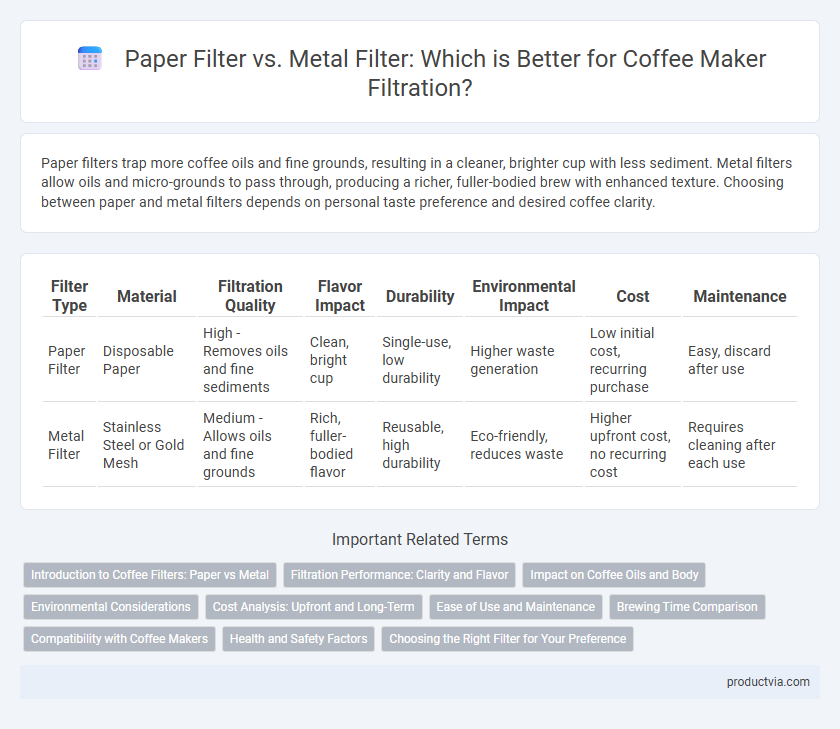Paper filters trap more coffee oils and fine grounds, resulting in a cleaner, brighter cup with less sediment. Metal filters allow oils and micro-grounds to pass through, producing a richer, fuller-bodied brew with enhanced texture. Choosing between paper and metal filters depends on personal taste preference and desired coffee clarity.
Table of Comparison
| Filter Type | Material | Filtration Quality | Flavor Impact | Durability | Environmental Impact | Cost | Maintenance |
|---|---|---|---|---|---|---|---|
| Paper Filter | Disposable Paper | High - Removes oils and fine sediments | Clean, bright cup | Single-use, low durability | Higher waste generation | Low initial cost, recurring purchase | Easy, discard after use |
| Metal Filter | Stainless Steel or Gold Mesh | Medium - Allows oils and fine grounds | Rich, fuller-bodied flavor | Reusable, high durability | Eco-friendly, reduces waste | Higher upfront cost, no recurring cost | Requires cleaning after each use |
Introduction to Coffee Filters: Paper vs Metal
Paper coffee filters offer a clean, crisp taste by effectively trapping oils and fine grounds, resulting in a smoother cup. Metal filters, often made from stainless steel, allow more oils and micro-grounds to pass through, enhancing body and richness in flavor. Selecting between paper and metal filters influences the coffee's clarity, texture, and overall sensory experience.
Filtration Performance: Clarity and Flavor
Paper filters provide superior filtration performance by effectively trapping fine coffee grounds and oils, resulting in a cleaner cup with bright clarity and a crisp flavor profile. Metal filters allow more oils and micro-particles to pass through, delivering a fuller-bodied coffee with rich texture but slightly less clarity. Choosing between paper and metal filters impacts flavor extraction and mouthfeel, catering to preferences for either crisp brightness or robust depth in brewing.
Impact on Coffee Oils and Body
Paper filters trap most coffee oils, resulting in a cleaner, brighter cup with lighter body and reduced sediment. Metal filters allow oils to pass through, enhancing the coffee's body and richness by preserving more natural oils and fine particles. Choosing between paper and metal filters significantly influences the texture and flavor intensity of the brewed coffee.
Environmental Considerations
Paper filters generate more waste due to their single-use nature, contributing to landfill volumes and resource consumption. Metal filters, typically made from stainless steel, offer a reusable alternative that reduces environmental impact by minimizing disposable waste. Choosing metal filters supports sustainability by lowering waste production and conserving natural resources over time.
Cost Analysis: Upfront and Long-Term
Paper filters typically have a lower upfront cost but require continuous purchasing, increasing long-term expenses for regular coffee drinkers. Metal filters involve a higher initial investment but are reusable, resulting in significant cost savings over time. Evaluating the cost-effectiveness depends on consumption frequency and preference for convenience versus sustainability.
Ease of Use and Maintenance
Paper filters offer easy disposal and minimal cleanup, making them highly convenient for users seeking low-maintenance coffee brewing. Metal filters require occasional thorough cleaning to prevent oil buildup but provide durability and eliminate the need for constant replacement. Both filter types cater to different preferences in ease of use and long-term maintenance demands.
Brewing Time Comparison
Paper filters generally result in a longer brewing time due to their slower water flow rate, which allows for better extraction of coffee flavors. Metal filters offer a faster brewing process as they have larger pores, enabling quicker water passage and reduced contact time with grounds. Choosing between paper and metal filters ultimately impacts brewing speed and can influence the intensity and clarity of the coffee.
Compatibility with Coffee Makers
Paper filters are compatible with most standard drip coffee makers due to their disposable nature and ability to fit various basket sizes, ensuring easy cleanup and consistent filtration. Metal filters, often made from stainless steel or mesh, require coffee makers designed to accommodate reusable filters, typically fitting specific models or brands that support eco-friendly brewing. Compatibility depends largely on the coffee maker's filter basket design, with some models offering interchangeable baskets to use either paper or metal filters based on user preference.
Health and Safety Factors
Paper filters effectively trap oils and fine coffee particles, reducing the amount of cafestol, a compound linked to increased cholesterol levels, which supports heart health. Metal filters allow more oils and micro-particles to pass through, potentially affecting individuals with sensitivities or cardiovascular concerns. Choosing paper filters enhances filtration by minimizing harmful substances, while metal filters require thorough cleaning to prevent bacterial buildup and ensure safety.
Choosing the Right Filter for Your Preference
Choosing between paper and metal filters for your coffee maker depends on your preference for flavor and convenience. Paper filters produce a cleaner, brighter cup by trapping oils and fine particles, while metal filters allow more oils through, resulting in a richer, fuller-bodied taste. Consider factors such as ease of cleaning, environmental impact, and desired flavor profile to select the ideal filter that suits your brewing style.
Paper filter vs Metal filter for filtration Infographic

 productvia.com
productvia.com